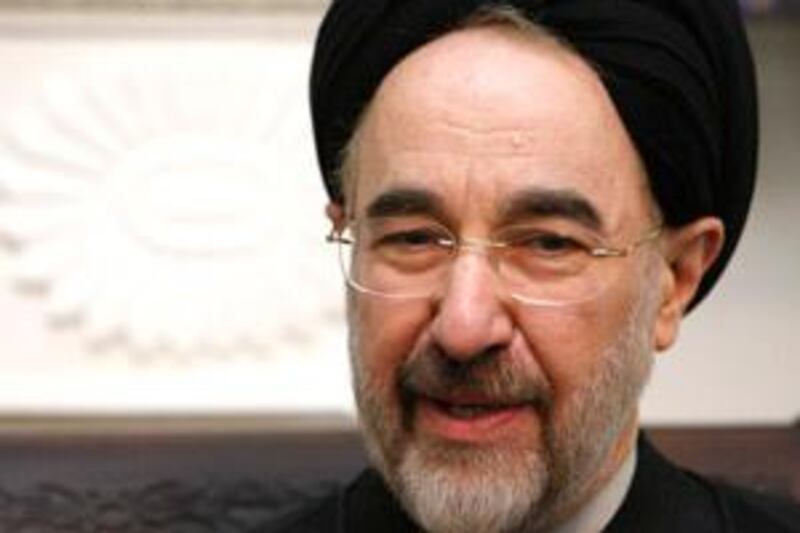TEHRAN // Mohammed Khatami, the former president who is running for the post again in this summer's elections, has publicly supported Iran's right to pursue a peaceful nuclear programme, while criticising Mahmoud Ahmadinejad's government for failing to prevent international sanctions. Mr Khatami, a reformist, made the comments over the weekend during campaign visits to the southern Iranian cities of Shiraz, Bushehr and Yasuj, where he was greeted by thousands of people.
He stressed that Iran had an irrevocable right not only to "nuclear energy" but also to "nuclear technology" and highlighted the role his government had played, from 1997 to 2005, in the development of the country's atomic programme. Mr Khatami blamed the Ahmadinejad administration for causing Iran's international isolation and for "wasting opportunities" with the former US administration under George W Bush.
"I believe we could have attained peaceful nuclear technology without compromising our principles and interests as much as a grain and [could have prevented] our nuclear case from being referred to the [United Nations] Security Council," Mr Khatami said. In Bushehr, where Iran's first and only nuclear power plant has been under construction by Russia for many years, Mr Khatami said interference from Iran's "enemies", a probable reference to US pressure on Russia, had delayed the completion of the plant.
Mohammed Atrianfar, a political analyst and member of the central council of the pro-Rafsanjani Servants of Construction Party (Kargozaran), which backs Mr Khatami's candidacy, said the former president was echoing the reformists' line on the nuclear programme. "What Mr Khatami said can be taken as a positive signal to the international community: Iran can join the international nuclear club and have nuclear technology but if the international community is concerned about the dual applications of nuclear fuel, Iran can delay [enrichment] until confidence is established regarding its programme."
Although the country's supreme leader, Ayatollah Khamenei, is the ultimate decision maker when it comes to the nuclear plan, the government has a decisive role in carrying out the plan of action, he said. During the last two years of Mr Khatami's presidency, Iran voluntarily suspended its uranium enrichment programme during negotiations with European powers. But just a few days before the end of his term, Iran lifted the moratorium after negotiations failed.
Iran said the package offered in return for a voluntary suspension - including economic incentives and promises of technical co-operation - excluded recognition of its right to enrichment. The nuclear negotiation team appointed by Mr Khatami's administration and headed by Hasan Rowhani, a moderate conservative, was dismissed by Mr Ahmadinejad immediately after he took office and Iran began increasing the number of its centrifuges.
The IAEA, the UN's nuclear watchdog, which had so far been the only international body dealing with Iran's nuclear programme referred the case to the UN Security Council and since then three sets of UN sanctions have been imposed. Hardliners and conservatives credit Mr Ahmadinejad's government with the country's nuclear achievements, including the completion of the enrichment cycle, and have on many occasions rebuked Mr Khatami's reformist administration for acquiescing to the West and slowing down that progress.
"Their analysis of the situation was based on too much optimism towards European countries and the US. They believed these countries would stop threatening Iran and would recognise our rights if Iran agreed to suspend its nuclear programme and complied with their wishes," said Hamid Reza Taraghi, a spokesman for the Islamic Coalition Party (Motalefeh) that supports Mr Ahmadinejad's nuclear approach and his candidacy in the June elections.
"This wrong analysis led to two years of delay in completing the uranium enrichment programme and it was during the period of voluntary suspension that [Mr Bush] called Iran a member of the axis of evil," Mr Taraghi said. It was most likely in response to these criticisms that Mr Khatami reminded a crowd of about 20,000 in Bushehr about his own administration's role in nuclear development. "Do you think all the progress regarding nuclear technology was made only during the past year or two?
"Many years of hard work have contributed to this progress," he said. Some ordinary Iranians seem to appreciate Mr Khatami's approach to foreign policy and the nuclear issue. "I strongly believe that we have a right to nuclear energy and I expect Khatami, as my preferred candidate, not to give it up," said Abbas Taghizadeh, 46, a taxi driver in Tehran. "But I also believe that much of the hardships like international sanctions and isolation of the country could be avoided if a more moderate foreign policy like that of Khatami was implemented."
msinaiee@thenational.ae





